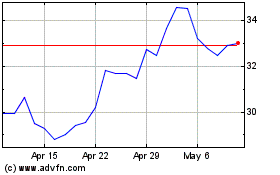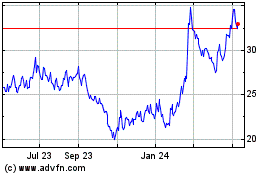Agios Pharmaceuticals, Inc. (Nasdaq: AGIO), a leader in cellular
metabolism and pyruvate kinase (PK) activation pioneering therapies
for rare diseases, today announced topline results from the global
Phase 3 ACTIVATE-KidsT study of mitapivat in children aged 1 to
<18 years with PK deficiency who are regularly transfused. Using
Bayesian methodology, the prespecified statistical criterion for
the primary endpoint in ACTIVATE-KidsT was not met using low or
moderate borrowing of data from the ACTIVATE-T study in adults. In
the ACTIVATE-KidsT study, 28.1% of patients in the mitapivat arm
achieved the primary endpoint of transfusion reduction response,
compared to 11.8% of patients in the placebo arm. Transfusion-free
response and normal hemoglobin response were secondary endpoints in
this study and only observed in patients in the mitapivat arm. In
the 32-week double-blind treatment period, mitapivat was generally
safe and well-tolerated, with safety results consistent with the
safety profile for mitapivat previously observed in adults with PK
deficiency who are regularly transfused.
“After years of working with the PK deficiency community and
caregivers whose children have no disease-modifying therapies, it
is gratifying to share encouraging efficacy and safety data that
may support the potential of a first-ever pediatric treatment for
this rare blood disorder,” said Sarah Gheuens, M.D., Ph.D., chief
medical officer and head of R&D at Agios. “We look forward to
completing our pediatric PK deficiency clinical development program
next year with the readout of the ACTIVATE-Kids study of mitapivat
in children who are not regularly transfused. More broadly, the
ACTIVATE-KidsT study represents Agios’ first pediatric data
readout. With our focus on lifelong, debilitating rare diseases, we
hope that this study will be the first of several pediatric studies
to make a positive impact in the lives of children facing rare
hemolytic anemias, including PK deficiency, thalassemia and sickle
cell disease.”
“Children with PK deficiency can experience significant disease
burden, including fatigue, the need for blood transfusions, and the
risk of iron overload. Symptoms of PK deficiency, disease
complications, and common supportive therapies can interfere with
regular childhood activities,” said Rachael F. Grace, M.D., MMSc;
Dana-Farber/Boston Children’s Cancer and Blood Disorder Center,
Harvard Medical School, Boston, an investigator in the
ACTIVATE-KidsT study. “The ACTIVATE-KidsT trial is the first study
of mitapivat in children who are regularly transfused and
demonstrates the potential for meaningful clinical benefit,
resolving the anemia and need for transfusions in a subset of
children.”
In addition, Agios has completed enrollment in the ACTIVATE-Kids
study of mitapivat in children with PK deficiency who are not
regularly transfused, and expects to report topline data in
2025.
Topline results for the Phase 3 ACTIVATE-KidsT study were as
follows:
- A total of 49 patients aged 1 to <18 years were enrolled in
the study, with 32 randomized to mitapivat twice-daily and 17
randomized to matched placebo. 30 patients (93.8%) in the mitapivat
arm and 16 (94.1%) in the placebo arm completed the 32-week
double-blind period of the study.
- The primary endpoint of the study was transfusion reduction
response (TRR), defined as ≥33% reduction in the total red blood
cell transfusion volume from Week 9 through Week 32 of the
double-blind period normalized by weight and actual study drug
duration compared with the historical transfusion volume
standardized by weight and to 24 weeks.
- The analysis of the primary endpoint was based on Bayesian
statistical methodology whereby the TRR data from the adult
ACTIVATE-T study inform and contribute to the analysis of TRR in
the ACTIVATE-KidsT study. The analysis was performed using a range
of relative weights of borrowing from the adult ACTIVATE-T study,
representing the prior degree of belief in the similarity of the
treatment effect in the pediatric and adult populations. The
prespecified statistical criterion for the primary endpoint in
ACTIVATE-KidsT was not met with low or moderate borrowing weights;
however, the results were clinically meaningful.
- 28.1% (9/32) of patients in the mitapivat arm achieved a
transfusion reduction response, compared to 11.8% (2/17) of
patients in the placebo arm.
- In addition, a higher proportion of patients in the mitapivat
arm compared to the placebo arm achieved the secondary endpoints of
transfusion-free response and normal hemoglobin response:
- 6 patients (18.8%) in the mitapivat arm compared to 0 in the
placebo arm had a transfusion-free response, defined as no red
blood cell transfusions from Week 9 through Week 32 of the
double-blind period.
- 4 patients (12.5%) in the mitapivat arm compared to 0 in the
placebo arm achieved a normal hemoglobin response, defined as
hemoglobin concentrations within normal limits at least once, 8
weeks or more after a transfusion, from Week 9 through Week 32 of
the double-blind period.
- In the 32-week double-blind treatment period of the study, a
similar proportion of patients had adverse events (AEs) in the
mitapivat and placebo arms and there were no discontinuations of
study treatment due to AEs.
- Safety results in this pediatric study were consistent with the
safety profile for mitapivat previously observed for adult patients
with PK deficiency who are regularly transfused.
Agios plans to present a more detailed analysis of the Phase 3
ACTIVATE-KidsT data at an upcoming medical meeting.
About PYRUKYND®
(mitapivat)PYRUKYND is a pyruvate kinase activator
indicated for the treatment of hemolytic anemia in adults with
pyruvate kinase (PK) deficiency in the United States, and
for the treatment of PK deficiency in adult patients in
the European Union.
IMPORTANT SAFETY INFORMATIONAcute
Hemolysis: Acute hemolysis with subsequent anemia has been
observed following abrupt interruption or discontinuation of
PYRUKYND in a dose-ranging study. Avoid abruptly discontinuing
PYRUKYND. Gradually taper the dose of PYRUKYND to discontinue
treatment if possible. When discontinuing treatment, monitor
patients for signs of acute hemolysis and anemia including
jaundice, scleral icterus, dark urine, dizziness, confusion,
fatigue, or shortness of breath.
Adverse Reactions: Serious adverse reactions
occurred in 10% of adult patients receiving PYRUKYND in the
ACTIVATE trial, including atrial fibrillation, gastroenteritis, rib
fracture, and musculoskeletal pain, each of which occurred in 1
patient. In the ACTIVATE trial, the most common adverse reactions
including laboratory abnormalities (≥10%) in patients with PK
deficiency were estrone decreased (males), increased urate, back
pain, estradiol decreased (males), and arthralgia. The adverse
reactions reported in the population of adult patients who were
regularly transfused (ACTIVATE-T) were consistent with that seen in
ACTIVATE.
Drug Interactions:
- Strong CYP3A Inhibitors and Inducers: Avoid concomitant
use.
- Moderate CYP3A Inhibitors: Do not titrate PYRUKYND beyond 20 mg
twice daily.
- Moderate CYP3A Inducers: Consider alternatives that are not
moderate inducers. If there are no alternatives, adjust PYRUKYND
dosage.
- Sensitive CYP3A, CYP2B6, CYP2C Substrates Including Hormonal
Contraceptives: Avoid concomitant use with substrates that have
narrow therapeutic index.
- UGT1A1 Substrates: Avoid concomitant use with substrates that
have narrow therapeutic index.
- P-gp Substrates: Avoid concomitant use with substrates that
have narrow therapeutic index.
Hepatic Impairment: Avoid use of PYRUKYND in
patients with moderate and severe hepatic impairment.
Please see full Prescribing
Information and Summary of
Product Characteristics for
PYRUKYND.
About AgiosAgios is the pioneering leader in PK
activation and is dedicated to developing and delivering
transformative therapies for patients living with rare diseases. In
the U.S., Agios markets a first-in-class pyruvate kinase (PK)
activator for adults with PK deficiency, the first
disease-modifying therapy for this rare, lifelong, debilitating
hemolytic anemia. Building on the company's deep scientific
expertise in classical hematology and leadership in the field of
cellular metabolism and rare hematologic diseases, Agios is
advancing a robust clinical pipeline of investigational medicines
with programs in alpha- and beta-thalassemia, sickle cell disease,
pediatric PK deficiency and MDS-associated anemia. In addition to
its clinical pipeline, Agios is advancing a preclinical TMPRSS6
siRNA as a potential treatment for polycythemia vera, and a
preclinical PAH stabilizer as a potential treatment for
phenylketonuria (PKU). For more information, please visit the
company’s website at www.agios.com.
Cautionary Note Regarding Forward-Looking
StatementsThis press release contains forward-looking
statements within the meaning of The Private Securities Litigation
Reform Act of 1995. Such forward-looking statements include those
regarding: the potential benefits of mitapivat; Agios’ plans for
the future clinical development of mitapivat in pyruvate kinase
deficiency; and Agios’ strategic plans and prospects. The words
“anticipate,” “believe,” “estimate,” “expect,” “intend,” “may,”
“plan,” “predict,” “project,” “would,” “could,” “potential,”
“possible,” “hope” and similar expressions are intended to identify
forward-looking statements, although not all forward-looking
statements contain these identifying words. Such statements are
subject to numerous important factors, risks and uncertainties that
may cause actual events or results to differ materially from Agios’
current expectations and beliefs. For example, there can be no
guarantee that any product candidate Agios or its collaborators is
developing will successfully commence or complete necessary
preclinical and clinical development phases, or that development of
any of Agios’ product candidates will successfully continue.
Moreover, there can be no guarantee that any medicines ultimately
commercialized by Agios will receive commercial acceptance. There
can be no guarantee that any positive developments in Agios’
business will result in stock price appreciation. Management's
expectations and, therefore, any forward-looking statements in this
press release could also be affected by risks and uncertainties
relating to a number of other important factors, including, without
limitation: risks and uncertainties related to the impact of
pandemics or other public health emergencies to Agios’ business,
operations, strategy, goals and anticipated milestones, including
its ongoing and planned research activities, ability to conduct
ongoing and planned clinical trials, clinical supply of current or
future drug candidates, commercial supply of current or future
approved products, and launching, marketing and selling current or
future approved products; Agios’ results of clinical trials and
preclinical studies, including subsequent analysis of existing data
and new data received from ongoing and future studies; the content
and timing of decisions made by the U.S. FDA, the EMA or
other regulatory authorities, investigational review boards at
clinical trial sites and publication review bodies; Agios’ ability
to obtain and maintain requisite regulatory approvals and to enroll
patients in its planned clinical trials; unplanned cash
requirements and expenditures; Agios’ ability to obtain, maintain
and enforce patent and other intellectual property protection for
any product candidates it is developing; Agios’ ability to
establish and maintain key collaborations; uncertainty regarding
any milestone or royalty payments related to the sale of Agios’
oncology business or its in-licensing of TMPRSS6 siRNA, and the
uncertainty of the timing of any such payments; uncertainty of the
results and effectiveness of the use of proceeds from the
transaction with Servier; competitive factors; and general
economic and market conditions. These and other risks are described
in greater detail under the caption "Risk Factors" included in
Agios’ public filings with the Securities and Exchange
Commission. Any forward-looking statements contained in this press
release speak only as of the date hereof, and Agios expressly
disclaims any obligation to update any forward-looking statements,
whether as a result of new information, future events or otherwise,
except as required by law.
Contacts:
Investor ContactChris Taylor, VP Investor
Relations and Corporate CommunicationsAgios
PharmaceuticalsIR@agios.com
Media Contact Dan Budwick1AB
dan@1abmedia.com
Agios Pharmaceuticals (NASDAQ:AGIO)
Historical Stock Chart
From Jul 2024 to Aug 2024

Agios Pharmaceuticals (NASDAQ:AGIO)
Historical Stock Chart
From Aug 2023 to Aug 2024
